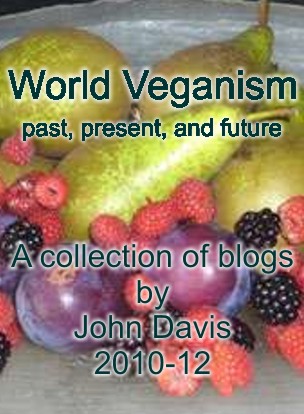March 16, 2011
 Gandhi is not the first name that vegans might think of as helping to launch the movement, and yet he did, on November 20, 1931, in London to be precise. He didn't call it 'vegan' of course, but it wasn't long before others came up with the word to describe what he was talking about.
Gandhi is not the first name that vegans might think of as helping to launch the movement, and yet he did, on November 20, 1931, in London to be precise. He didn't call it 'vegan' of course, but it wasn't long before others came up with the word to describe what he was talking about.
We need to go back a bit - in 1888 the London Vegetarian Society split from the original UK society, based in Manchester, to form a second national group. In 1891 Gandhi was a law student in London and joined their committee for a while, later describing this in some detail in his autobiography.
On leaving India the young Gandhi had made a religious vow to his mother not to eat meat while he was in London, and he kept to it with great difficulty. One day he found a vegetarian restaurant and on the way in picked up a booklet by Henry Salt entitled A Plea for Vegetarianism (1885) which persuaded Gandhi that being vegetarian was important in its own right - and in which Salt wrote: "...even dairy produce is quite unnecessary".
Salt's next book, in 1892: Animals' Rights, Considered in Relation to Social Progress is generally recognised today as groundbreaking.
In 1931 Gandhi, now world-famous for his non-violent resistance in India, went to London to meet the government, and while he was there agreed to give a talk for the London Vegetarian Society, with the title of The Moral Basis of Vegetarianism'.
The photo on the right is Gandhi at that meeting, next his old friend Henry Salt who had founded the Humanitarian League and written 40 books to promote his ethical ideals. By 1931 Gandhi wanted something different, after some opening remarks he said:
"Forty years ago I used to mix freely with vegetarians......................... I notice also that it is those persons who became vegetarians because they are suffering from some disease or other - that is from purely the health point of view - it is those persons who largely fall back. I discovered that for remaining staunch to vegetarianism a man requires a moral basis."
Whether Gandhi was statistically correct in this claim is still the subject of much debate today. But he wanted to go further:
"I would give up milk if I could, but I cannot. I have made that experiment times without number. I could not, after a serious illness, regain my strength unless I went back to milk. That has been the tragedy of my life. But the basis of my vegetarianism is not physical, but moral. If any said that I should die if I did not take beef-tea or mutton, even under medical advice, I would prefer death. That is the basis of my vegetarianism."
Milk drinking a 'tragedy' - and this to an audience of mostly ovo-lacto-vegetarians. In his autobiography Gandhi says he gave up milk in 1912 (in South Africa) but six years later contracted dysentery (back in India) and was reluctantly persuaded to take goat's milk, which he then did on and off for life, but he never returned to cow's milk (a significant distinction in India) - soy milk was still largely unknown outside of East Asia at that time.
He also wrote elsewhere: "Milk is an animal product and cannot by any means be included in a strictly vegetarian diet... I am convinced that in the vast vegetable kingdom there must be some kind, which while supplying those necessary substances that we derive from milk and meat is free from their drawbacks, ethical and other." (source below).
But Gandhi had been just warming up in this talk to the London Vegetarian Society, finally making his point:
"... the only basis for having a vegetarian society and proclaiming a vegetarian principle is, and must be a moral one."
But only a few years earlier in his 1925 autobiography Gandhi described an issue that arose back in 1891, while he was on the LVS committee. He objected to action against a particular member because: "... it had nothing to do with the declared object of the Society, which was simply the promotion of vegetarianism and not of any system of morality."
He knew very well that all Vegetarian Societies kept the diet itself as their core function, and would not discriminate against any members just because they had different reasons for adopting the diet.
And yet he clearly wanted something which would bring together those who were motivated by morality, and who shared his objection to dairy products (and eggs of course). His talk was published in full in the various vegetarian journals where it was widely read by the minority of members who had always kept to their ethically-based plant-only diet. Gandhi certainly didn't invent that concept, but such outspoken support from a major world figure, with Henry Salt by his side, must have boosted their confidence enormously.
Within a few years they were arguing for a distinct ethics/morality based 'non-dairy' section within the Vegetarian Society, but with slow communications, and the 2nd World War intervening, it took until 1944 for that proposal to be rejected. They responded by creating a new society, on exactly the linesthat Gandhi had proposed - inventing the word 'vegan' to name it.
- See also: 'The Moral Basis of Vegetarianism' - a compilation of articles by Gandhi, including the full text of the talk above, some others originally in Hindi, translated and published in 1959 - with the first section very specific about milk and eggs (PDF 144k): www.ivu.org/history/gandhi/the_moral_basis_of_vegetarianism.pdf
- Much more about Gandhi and vegetarianism at: www.ivu.org/history/gandhi
- More about Henry Salt at: www.ivu.org/history/salt
- Salt in turn was influenced by, and wrote several books about, the poet Percy Bysshe Shelley, see above.
 The photo right shows the1931 meeting coming together, just before Gandhi spoke (no chairs...) The December 1931 issue of Vegetarian News (London) printed the full text of Gandhi's talk, along with a descriptive article which stated that about 500 were present and that Henry Salt also spoke.
The photo right shows the1931 meeting coming together, just before Gandhi spoke (no chairs...) The December 1931 issue of Vegetarian News (London) printed the full text of Gandhi's talk, along with a descriptive article which stated that about 500 were present and that Henry Salt also spoke.
 John Davis
John Davis
